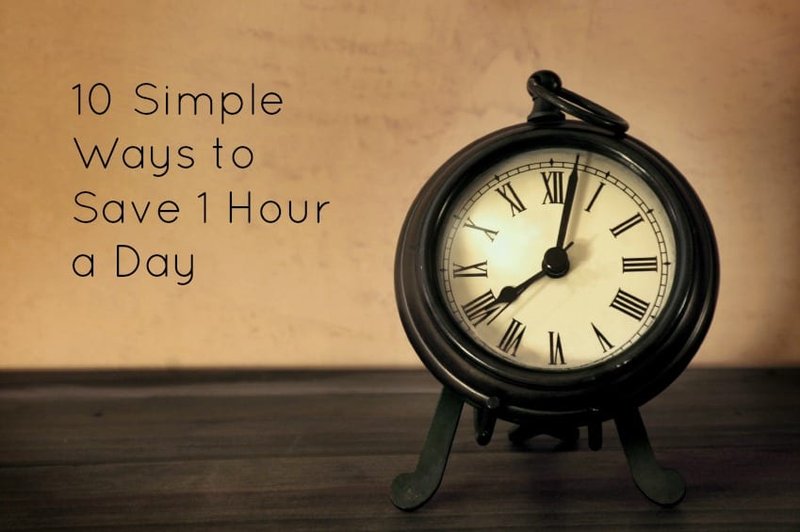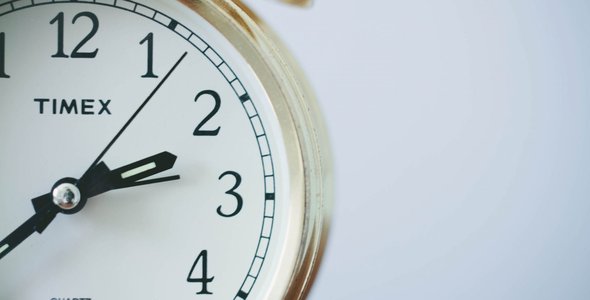10 Simple Ways To Save 1 Hour A Day
Time Management

Everyone loves a good time hack. So I’ve gathered some of my favorite bite-sized strategies for you to experiment with. Without further ado here are 10 simple ways to save 1 hour (or more) a day.
Be sure to let me know which one is your favorite in the comments below!
- Put down the electronics. I can’t not say this because I know from my own experience just what a huge time suck my computer, phone, and TV can be. Hell even my pedometer gets too much of my attention. It is not natural. Set aside time to unplug even for just 10 minutes a day.
- Block 1 hour of distraction-free time a day. Actually put it on the calendar. No people, email, or phone (see above) are allowed. It’s just you and the one task you want to focus on. Notice just how much faster you get this task completed.
- Sleep 7 – 9 hours a night. Please don’t fall into the self-delusional trap of thinking that less sleep = more productivity. The research shows you are lying to yourself and everyone around you. It’s time to wake up and get more sleep. (See what I did there?)
- Process e-mail in batches. The more you e-mail the more e-mail you will receive. Imagine a world with realistic expectations about your response time and availability. You alone have the power to make this happen. Setting aside small chunks of time to deal with your inbox is a good place to start.
- Plan your day. Take 5 minutes to determine your 3 highest priorities for the day. Don’t worry about slacking off – you can always go back from more once these are completed. Use the Magic Line Method to separate your actual to-do’s from your reminders.
- Use a crock pot. Take 15 minutes in the morning to make your dinner for 2 or 3 days. Better yet take an hour or two on Sundays and make your meals for the week. Even if you just plan your meals you will save yourself massive amounts of time – and stress.
- Work from home. For those that have the option of working from home please take heed: this is your chance to get even more done on a consistent basis without spending time on commuting, office interruptions, or having to get out of your yoga pants. It is up to you to prove that face time at the office no longer equals productive time.
- Outsource. Cleaning your home. Errand running. Meal prep. Lawn care. Bill pay. Dog walking. ALL of these tasks and hundreds more can easily be outsourced to a trustworthy service provider. Virtual and personal assistants can even manage most of these tasks and people for you. Let go of the guilt and decide your time is worth it.
- Let go of that 1 thing. You know the thing. It’s been staring at you in the face for months. You really, really feel like you should do it but you just can’t get yourself to make it happen. Release the energetic baggage of this task/project/obligation and let it go. Now focus your energy on the stuff that counts.
- Speak wisely. Is It True? Is It Necessary? Is It Kind? These are the often-cited criterion of effective communication. Use these filters the next time you opt to schedule a meeting, send an email, or pick up the phone. Rarely do we consider just how much superfluous time and energy is expended on unnecessary communication.
Bonus Time Hack
11. Take breaks. According to the research, consistent productivity must include recovery time. Giving yourself permission to “be off” throughout your day will go a long way to supporting your focus and energy when you are “on”.
Now pick 1 or 2 strategies that feel laughably doable (or break it down until they do) and start experimenting. Your only job is to notice what works and what doesn’t. Tweak from there.
What did I miss? Where can you save 1 hour a day without trying that hard? Share your comments below.
Latest Blog posts
![[Free Meditation] The Dangers Of Self-Improvement](/media/images/Free_Meditation_The_Da.2e16d0ba.format-jpeg.fill-590x300.jpg)
[Free Meditation] The Dangers Of Self-Improvement
How you get into the water is less important than actually being in the water.

Resources For Women With ADHD
I recently sat down with Linda Roggli, PCC, for a quick and informative interview.

10 Hard To Believe (But True) Productivity Statistics
Here are some of my favorite hard to believe productivity statistics that help point out what science has known longer than our society